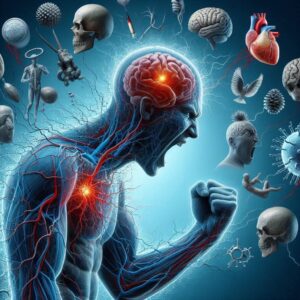Transform Your Anger into Constructive Energy: Discover the Power of Therapy
Anger is a core emotional response that individuals experience at various stages throughout their lives. This strong emotion can arise from numerous sources, such as feelings of danger, personal affronts, frustration, or experiences of betrayal, injury, or insult. Gaining insight into the intricate nature of anger is crucial for nurturing personal development and achieving emotional self-control. By pinpointing the origins and catalysts of this emotion, individuals can initiate a transformative journey toward healthier emotional reactions, resulting in improved mental health and emotional resilience.
It’s important to understand that feeling anger is not inherently negative; rather, the crucial aspect lies in how we communicate and handle this potent emotion. Anger can take many forms, from mild irritation and frustration to deep-seated resentment and explosive rage, each affecting our interactions and general well-being in unique ways. By cultivating awareness of these different manifestations, individuals can navigate their emotional experiences more adeptly, leading to healthier and more constructive relationships with others.
Physical signs related to anger may include a rapid heartbeat, heightened blood pressure, and increased muscle tension. If not addressed, anger can escalate into harmful behaviors that jeopardize relationships, obstruct career advancement, and reduce overall satisfaction in life. Recognizing the symptoms of anger and comprehending its root causes are critical steps in effectively managing this powerful emotion, ensuring that it does not take control of one’s life.
Anger can be triggered by various factors, including external situations, internal thoughts, and physiological responses. By thoroughly examining these triggers, individuals can uncover vital insights about their anger, setting the stage for developing effective coping mechanisms. This emotional exploration can greatly enhance personal growth and emotional awareness, enabling individuals to manage their feelings proactively and positively during difficult situations.
Essential Techniques for Effectively Managing Anger and Cultivating Emotional Harmony
- Recognize that anger is a normal emotional reaction that can become problematic without effective management.
- If left unchecked, anger can lead to serious consequences for both mental and physical health.
- Engaging in anger management therapy equips individuals with vital tools for addressing anger constructively.
- Therapeutic approaches include techniques like deep breathing and improved communication skills to tackle emotional challenges.
- Therapy helps identify personal triggers and the underlying issues that contribute to anger.
 Understanding the Serious Health Risks Associated with Uncontrolled Anger
Understanding the Serious Health Risks Associated with Uncontrolled Anger
Exploring the Physical Health Risks Linked to Chronic Anger
Extensive studies have established a significant connection between chronic anger and severe health issues. Such health complications may range from elevated blood pressure and cardiovascular diseases to weakened immune function, all of which heighten the risk of strokes and other critical medical incidents. In addition, persistent anger can lead to debilitating ailments such as irritable bowel syndrome, insomnia, and tension headaches, which can disrupt daily functioning and overall health. Acknowledging these health risks is vital for individuals to take proactive measures in managing their anger effectively.
Understanding the Impact of Unmanaged Anger on Mental Health and Relationships
The effects of unmanaged anger extend far beyond physical health, posing significant challenges for mental wellness. Ongoing feelings of anger can serve as precursors to anxiety disorders, depression, and issues with substance abuse. Furthermore, unchecked anger can strain interpersonal relationships, often leading to conflicts and emotional disconnect from loved ones, perpetuating a cycle of isolation and distress that can be challenging to break. Recognizing these consequences is essential for cultivating healthier relationships and achieving emotional stability.
Recognizing the Importance of Support: Mastering Anger Management Skills
Understanding the harmful consequences of uncontrolled anger on both mental and physical health highlights the importance of seeking assistance and learning effective anger management techniques. Individuals must confront the reality that unchecked anger can jeopardize their overall well-being. By acknowledging the long-term effects of chronic anger, individuals are more likely to feel empowered to actively pursue constructive strategies and supportive resources that foster healthy emotional expression and management.
Experience the Life-Changing Benefits of Anger Management Therapy
Engaging in anger management therapy presents numerous benefits for those grappling with overwhelming feelings of anger. One significant advantage is the opportunity to explore the root causes of anger while learning practical coping strategies. During therapy sessions, individuals can identify what triggers their anger, facilitating a deeper understanding of their emotional responses and behavioral patterns. This heightened self-awareness is crucial for developing effective anger management techniques.
Therapy provides a safe and nurturing environment for individuals to reflect on their emotions and discover healthier ways to express and cope with anger. Clients not only gain insights into their emotional states but also cultivate vital communication skills that can enhance relationships and reduce conflict. By empowering individuals to regain control over their emotions, anger management therapy can lead to a more balanced and fulfilling life.
Moreover, anger management therapy is instrumental in helping individuals break free from harmful behaviors often associated with uncontrolled anger. By interrupting negative patterns, clients can reclaim authority over their lives and build healthier, more fulfilling relationships. By applying effective coping strategies and stress management techniques, individuals can diminish the adverse impacts of anger on both their mental and physical health. Ultimately, the transformative benefits of anger management therapy can result in significant, lasting improvements in an individual’s life.
 Diverse Techniques and Approaches Utilized in Anger Management Therapy
Diverse Techniques and Approaches Utilized in Anger Management Therapy
Anger management therapy equips clients with a variety of effective techniques and strategies for managing their anger in a constructive manner. One commonly used method is deep breathing exercises, which help individuals regulate their physiological responses to anger while alleviating stress and tension. Mindfulness meditation is another powerful technique introduced in therapy, encouraging individuals to concentrate on the present moment and enhance their awareness of their thoughts and emotions.
Cognitive restructuring is a vital aspect of anger management therapy. This method involves identifying and challenging negative thought patterns, replacing them with more rational and balanced viewpoints. By reframing their understanding of triggering situations, individuals can learn to respond to anger in a more constructive way. Additionally, therapy often integrates problem-solving skills that assist clients in effectively addressing the root causes of their anger.
Furthermore, assertiveness training is commonly incorporated into anger management therapy, empowering individuals to express their needs and establish healthy boundaries in a respectful manner. Those who master these techniques and strategies in therapy can cultivate a versatile toolkit for managing their anger across various contexts, enhancing their adaptability and emotional resilience.
Investigating Triggers and Roots of Anger with Therapeutic Insights
Therapeutic sessions provide individuals with the chance to explore the specific triggers and underlying issues that contribute to their anger. By reflecting on various circumstances, thoughts, and emotions, clients can gain valuable insights into what ignites their anger. Identifying these triggers enables individuals to recognize warning signs early on before they escalate into uncontrollable rage, promoting proactive anger management.
Therapy serves as an essential resource for those aiming to identify their anger triggers and tackle the core issues fueling these intense emotions. This process may involve examining past experiences, traumas, or learned behaviors that influence one’s emotional reactions. Effectively addressing these underlying factors can lead to significant breakthroughs in healing emotional wounds, ultimately fostering a sense of peace and emotional balance.
In a therapeutic environment, individuals are provided a safe space to delve into their triggers and underlying concerns without fear of judgment or criticism. This journey of self-discovery can be empowering, equipping clients with the essential tools to manage and channel their anger in healthy, constructive ways.
The Transformative Impact of Cognitive Behavioral Therapy on Anger Management
Challenging Irrational Beliefs to Encourage Rational Thought Patterns
Cognitive Behavioral Therapy (CBT) seeks to confront irrational beliefs and replace them with logical, balanced thought processes. By identifying and addressing cognitive distortions, individuals can develop a more constructive and realistic perspective on situations that trigger their anger, leading to healthier emotional responses. This method not only aids in anger management but also contributes to overall emotional health and stability.
Equipping Individuals with Practical Tools for Everyday Anger Management
In addition to identifying cognitive distortions, CBT empowers individuals with practical coping strategies for managing anger effectively. Techniques such as relaxation exercises, assertiveness training, and problem-solving skills are critical for addressing the root causes of anger. These strategies provide individuals with actionable tools that can be utilized in daily scenarios, facilitating effective regulation and management of their emotional responses.
Enhancing Self-Awareness to Improve Emotional Regulation
Moreover, CBT enhances self-awareness by helping individuals understand the connections between their thoughts, emotions, and behaviors. Gaining clarity on these relationships equips individuals to better manage their emotional reactions to anger-triggering situations. Mastering effective anger management is vital for fostering emotional regulation and overall well-being. Cognitive Behavioral Therapy plays a crucial role in this journey, providing individuals with the skills needed to navigate their anger and elevate their quality of life.
 Ensuring Lasting Success: Continued Support and Resources After Therapy
Ensuring Lasting Success: Continued Support and Resources After Therapy
For those who have completed anger management therapy, it is essential to continue seeking support and utilizing available resources to sustain their personal growth. To further bolster their anger management skills, individuals may consider joining support groups or engaging in individual counseling sessions. Support groups offer an excellent opportunity to connect with others facing similar challenges, fostering a sense of community and understanding. These groups create a platform for sharing experiences and learning from one another, aiding in reducing feelings of isolation and promoting a sense of belonging.
In addition to ongoing support, individuals can access various resources, including self-help books, online platforms, and mobile applications designed to facilitate effective anger management. These tools provide additional strategies and techniques for practicing healthy coping mechanisms outside of therapy sessions. Furthermore, maintaining progress after therapy may necessitate lifestyle adjustments that support overall well-being, such as regular physical activity, balanced nutrition, adequate sleep, and stress-reduction practices.
Incorporating these lifestyle changes into daily routines can significantly reduce the likelihood of experiencing overwhelming anger. Understanding and managing the potent emotion of anger is crucial for maintaining personal control. The consequences of uncontrolled anger can severely impact both mental and physical health, highlighting the importance of seeking guidance through anger management therapy. This comprehensive understanding equips individuals with the knowledge they require to navigate their emotions effectively.
Therapy remains an invaluable resource for individuals contending with the complexities of uncontrolled anger. It empowers them to understand their emotional triggers, confront underlying issues, and acquire practical strategies, while providing the necessary support for sustained progress. By equipping individuals with the tools and knowledge needed to manage their anger, therapy fosters healthier coping mechanisms and enhances overall emotional well-being.
Presented By:
References
- Teen Addiction Treatment Ames Iowa | Ember Recovery. https://emberrecovery.org/teen-addiction-treatment-in-iowa/
- Why Men Should Not Cover Up Their Emotional Distress | TheBeardMag. https://www.thebeardmag.com/lifestyle/health/why-men-should-not-cover-up-their-emotional-distress/
The Article: Interventions for Anger Management appeared first on Anger Management Leyland.
The Article Managing Anger: Proven Strategies for Success appeared first on https://mcrtherapies.com
The Article Proven Strategies for Success in Managing Anger Was Found On https://limitsofstrategy.com
The Article Managing Anger: Proven Strategies for Success First Appeared ON
: https://ad4sc.com
Comments are closed